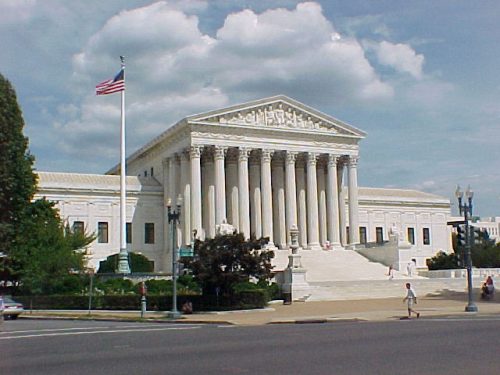

Via Flickr

This work is licensed under a Creative Commons Attribution 2.0 Generic License.
By Leslie Garcia
WASHINGTON, DC – In the case Allen v. Milligan, the U.S. Supreme Court Thursday made a historic decision by supporting Black voters who opposed Alabama’s 2021 congressional map and asked for a redrawing of the map because it violated the Voting Rights Act of 1965 by reducing Black political power, said the ACLU in a statement.
The state legislature passed the congressional map that allowed Black voters being able to only elect their choice of candidate for only one of the seven districts, despite making up 27 percent of the voting-age population.
In November 2021, the case was brought in and represented by the Legal Defense Fund (LDF), American Civil Liberties Union, Hogan Lovells LLP, ACLU of Alabama, Wiggins, Patazis, Fisher & Goldfarb, and Childs, on behalf of Khadidah Stone, Letetia Jackson, Evan Milligan, Shalela Dowdy, Greater Birmingham Ministries and the Alabama State Conference of the NAACP.
However, it was not argued in court until Oct. 4, 2022
The U.S. Supreme Court’s ruling accounted for a historic milestone, said the ACLU, for voting rights amidst the numerous attacks on democracy. The court used substantial evidence from the VRA’s passing in the 1980s to prove the discrimination that was presented by the plaintiffs.
In its (5-4) decision, the court also affirmed that under Section 2 of the VRA, race can be used in the redistricting process to provide equal opportunities to communities of color and ensure they are not packed and cracked in a way that impermissibly weakens their voting strength, said the ACLU.
The U.S. Supreme Court’s decision in Shelby County v. Holder removed federal oversight and allowed for hostile states to weaken Black voters and voters of color’s voices, the ACLU said, adding, the court’s decision in Allen v. Milligan made a clear statement to ensure that voters of color are not prevented from electoral process participation.
The LDF seniors counsel Deuel Ross stated that “This decision is a crucial win against the continued onslaught of attacks on voting rights”
He also argued that “Alabama attempted to rewrite federal law by saying race had no place in redistricting. But because of the state’s sordid and well-documented history of racial discrimination, race must be used to remedy that past and ensure communities of color are not boxed out of the electoral process.
Ross added, “While the Voting Rights Act and other key protections against discriminatory voting laws have been weakened in recent years and states continue to pass provisions to disenfranchise Black voters, today’s decision is a recognition of Section 2’s purpose to prevent voting discrimination and the very basic right to a fair shot.”
“The Supreme Court rejected the Orwellian idea that it’s inappropriate to consider race in determining whether racial discrimination led to the creation of illegal maps. This ruling is a huge victory for Black Alabamians ” said the senior staff attorney of ACLU’s Voting Rights Project, Davin Rosborough.
The following statement was released by the case plaintiffs, “In 2021, Alabama lawmakers targeted Black voters by packing and cracking us so we could not have a meaningful impact on the electoral process. They attempted to redefine Section 2 of the Voting Rights Act and shirk their responsibility to ensure communities of color are given an equal opportunity to elect their preferred candidates.
“Today, the Supreme Court reminded them of that responsibility by ordering a new map be drawn that complies with federal law – one that recognizes the diversity in our state rather than erasing it. This fight was won through generations of Black leaders who refused to be silent, and while much work is left, today we can move forward with these reaffirmed protections civil rights leaders fought and died for.”
ACLU of Alabama legal director, Tish Gotell Faulks commented: “The key takeaway from today’s decision is the court’s acknowledgment that the Alabama Legislature knowingly continued its legacy of drawing illegal voting districts that disenfranchise Black voters. The Alabama Legislature must now draw new, fairer voting districts.”
Faulks added, “Though we were victorious today, history shows us that lawmakers will erect many more hurdles before every Alabamian, irrespective of their race, can vote for representatives that reflect their beliefs, values, and priorities.
“Efforts remain underway from Montgomery to Jackson to Baton Rouge, and elsewhere across the country to minimize, marginalize, and eliminate the ability of Black and brown people to have a voice in their communities. Our communities then — as now — understand that the fight to uphold our civil rights is a daily pursuit. We will persist.”